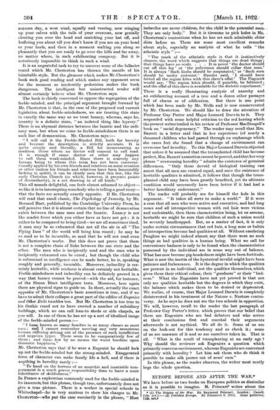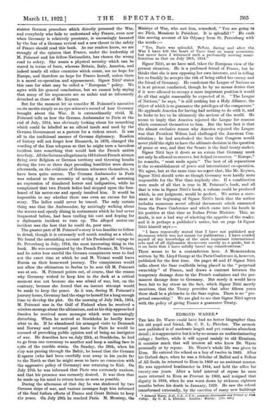EUROPE BEFORE AND AFTER THE WAR.* Wz have before us
two books on European politics as dissimilar as it is possible to imagine. M. Poincarel writes about the
• (1) The Origins of the War. By Raymond Poincare. London: Cassell. [128. net..]—(2) Pearelese Europe. By Francesco S. :intl. Same publisher. 112a. net): . sinister German procedure which directly procured the War, and everybody who fails to understand why France, even now when Germany is relatively prostrate, is unceasingly haunted bythe fear of a German revival and a new threat to the safety of France should read this book. As our readers know, we are strongly of the opinion that France, under the leadership of M. Poincare and his fellow-Nationalists, has chosen the wrong road to safety. She wants a physical security which can be stated in terms of force, whereas Britain, Italy, America, and indeed nearly all other countries which count, see no hope for Europe, and therefore no hope for France herself, unless there is a moral co-operation and appeasement. Signor Nitti2 states this case for what may be called a " European " policy. We agree with his general conclusions, but we cannot help saying that many of his arguments are as unfair and as inhumanly detached as those of Mr. Keynes.
But for the moment let us consider M. Poincare's narrative on its merits simply as an eye-witness's record of how Germany brought about the War. It is extraordinarily vivid. M. Poincare tells us how the German Ambassador in Paris at the end of July, 1914, was obviously looking about for something which could be labelled as an official insult and used by the German Government as a pretext for a violent retort. It was all in the traditional manner of German diplomacy. Readers of history will not forget how Bismarck, in 1870, changed the wording of the Ems telegram so that he might turn a harmless incident into something that would lash the French nation into fury. All the German allegations in 1914 about French airmen flying over Belgium or German territory and throwing bombs during the two or three days preceding hostilities were shown afterwards, on the evidence of German witnesses themselves, to have been quite untrue. The German Ambassador in Paris was reduced to the necessity of acting a part, of assuming an expression of simulated horror and indignation, while he complained that two French ladies had stepped upon the foot- board of his motor-car and openly insulted him. It would be impossible to say whether there was even an excuse for his story. The ladies could never be traced. The only certain thing was that the Ambassador, by untiringly walking about the streets and openly dining in restaurants which he had never frequented before, had been trailing his coat and hoping for a diplomatic incident to turn up. The alleged motor-car incident was the best that he could do, poor man.
The greater part of M. Poineare's story is too familiar to follow in detail, though it is extremely well worth reading as a whole. We found the astonishing account of his Presidential voyage to St. Petersburg in July, 1914, the most interesting thing in the book. He was accompanied by the French Premier, M. Viviani, and he notes how careful the German conspirators were to find out the exact time at which he and M. Viviani would leave Russia on their homeward journey. The conspirators would not allow the ultimatum to Serbia to be sent till M. Poineare was at sea. M. Poincare points out, of course, that the reason why Germany wished to keep him in the dark at a critical moment was not because she was afraid of war, but, on the contrary, because she feared that an instant attempt would be made to keep the peace. As it was, during M. Poincare's journey home, Germany had the stage to herself for a long enough time to develop the plot. On the morning of July 24th, 1914, M. Poincare was in the Gulf of Finland when he received a wireless message about the ultimatum, and as his ship approached Sweden he received more messages which were increasingly disturbing. When he arrived at Stockholm he hardly knew what to do. If he abandoned his arranged visits to Denmark and Norway and returned post haste to Paris he would be accused of provoking public opinion and of being an instigator of war. He describes how on July 25th, at Stockholm, he had to go from one ceremony to another and keep a smiling face in spite of the terrible strain. On Sunday, the 26th, when his ship was passing through the Baltic, he heard that the German Emperor (who had been carefully sent away in his yacht far to the North so that he might seem to have no connexion with the aggressive policy of Germany) was returning to Kiel. On July 27th he was informed that Paris was extremely anxious, and that his presence was earnestly desired. It was then that he made up his mind to return home as soon as possible. - During the afternoon of that day he was shadowed by two German ships of war, and various messages kept him informed of the. final ferlorn efforts of France and Great Britain to keep the peace. On July 29th he reached Paris. M. Messimy, the Minister of War, who met him, remarked, "You are going to see Paris, Monsieur le President. It is splendid ! " He ends this moving account of his Odyssey from St. Petersburg with the words :- " Yes, Paris was splendid. Before, during and after the War I have • felt the heart of Paris beat on many occasions; but never have I witnessed such a profoundly moving mani- festation as that on July 29th, 1914.'
Signor Nitti, as we have said, takes the European view of the present situation. He is a professed friend of France, but he thinks that she is now opposing her own interests, and in telling
her so frankly he accepts the risk of being called her enemy and the friend of Germany. He condemns the League of Nations as it is at present conducted, though he by no means denies that
if it were allowed to occupy a more important position it would do all that might reasonably be expected of it. "The League of Nations," he says, "is still nothing but a Holy Alliance, the
object of which is to guarantee the privileges of the conquerors." Ho applauds America for having had nothing to do with it, and he looks to her to be ultimately the saviour of the world. He seems to imply that America rejected the League for reasons which commend themselves to him. But the bare fact is that the almost exclusive reason why America rejected the League was that President Wilson had challenged the American Con- stitution ; he had overlooked the facts that Congress would never yield the right to have the ultimate decision in the question of peace or war, and that the Senate is the final treaty-maker.
Signor Nitti lays it down as an axiom that Germany must not only be allowed to recover, but helped to recover. " Europe," he remarks, "must smile again." The best of all reparations is the re-establishment of peace and international co-operation.
We agree, but at the same time we regret that, like Mr. Keynes, Signor Nitti should write as though Germany were hardly more responsible for the War than anybody else. If a combination were made of all that is true in M. Poineare's book, and all that is wise in Signor Nitti's book, a volume could be produced which, in our judgment, would be perfect. We notice a state- ment at the beginning of Signor Nitti's book that the author includes numerous secret official documents which emanated from the Peace Conference and which came into his hands in his position at that time as Italian Prime Minister. This, no doubt, is not a bad way of whetting the appetite of the reader, and it is perhaps a publisher's notice, but on page 14 Signor Nitti himself says :— " I have repeatedly stated that I have not published any document which was not meant for publication ; I have availed myself of my knowledge of the most important international acts and of all diplomatic documents merely as a guide, but it is on facts that I have solidly based my considerations."
There seems to be a contradiction here. A Memorandum written by Mr. Lloyd George at the Paris Conference is, however,
published for the first time. On pages 46 and 47 Signor Nitti talks about the Saar coalfields being placed in the "perpetual ownership" of France, and draws a contrast between the temporary damage done to the French coalmines and the per- manent damage done to Germany. But surely it would have
been fair to lay stress on the fact, which Signor Nitti merely mentions, that the Treaty provides that after fifteen years there shall be a plebiscite in the Saar region. There is no "per- petual ownership." We are glad to see that Signor Nitti agrees with the policy of giving France a guarantee Treaty.



































 Previous page
Previous page